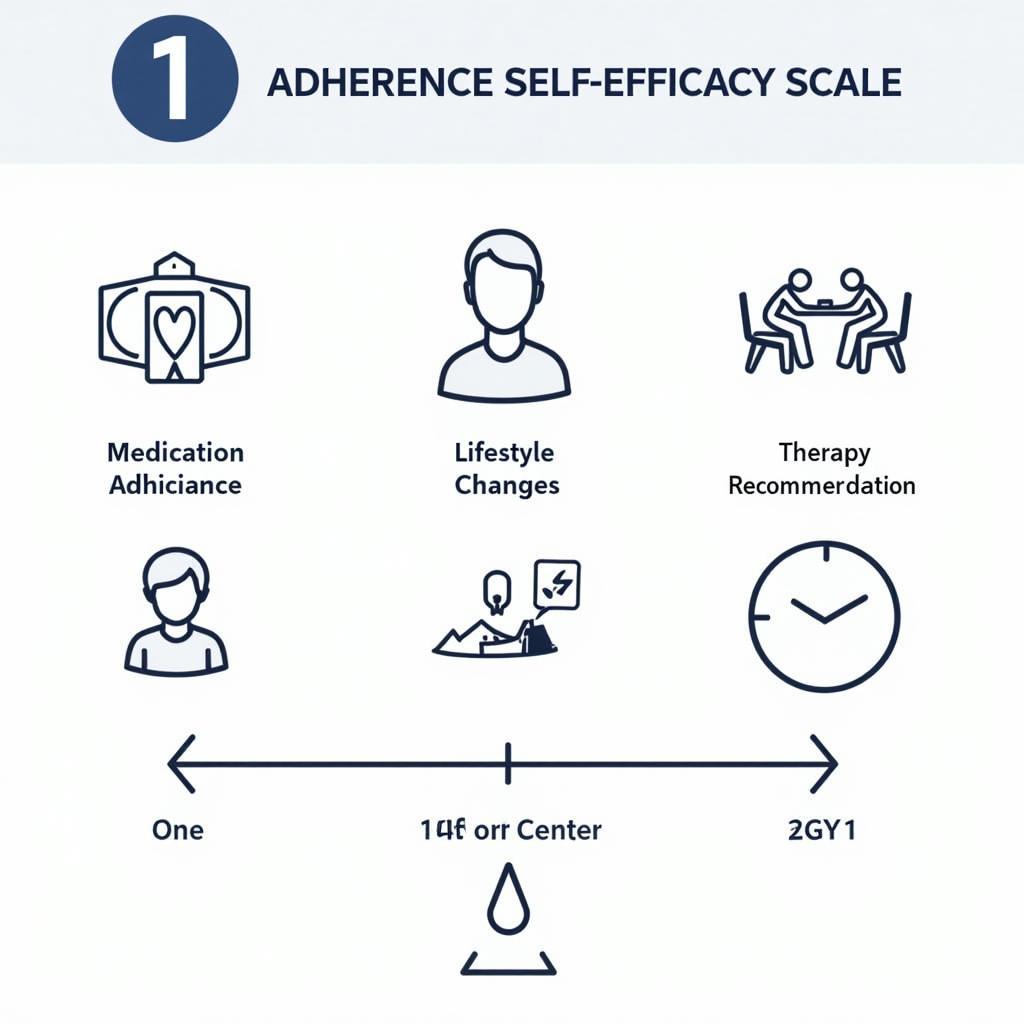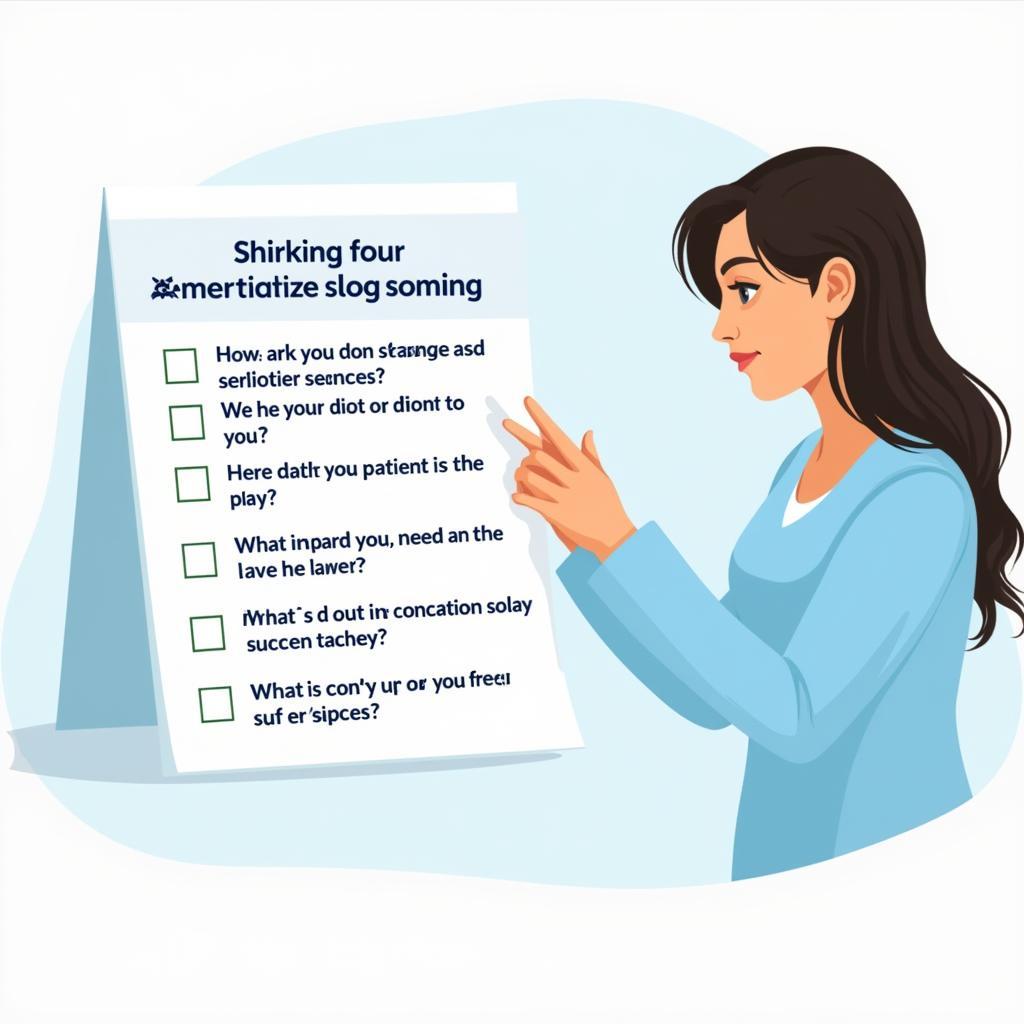The Adherence Self-Efficacy Scale (ASES) is a crucial tool in healthcare, used to assess a patient’s belief in their ability to follow a prescribed medical regimen. This self-reported scale provides valuable insights into a patient’s confidence in adhering to medication, lifestyle changes, or therapy, ultimately contributing to better health outcomes.
What is the Adherence Self-Efficacy Scale (ASES)?
The ASES is a psychological measurement tool designed to evaluate an individual’s self-efficacy regarding medical adherence. Self-efficacy, a concept central to social cognitive theory, refers to an individual’s belief in their capacity to successfully execute behaviors necessary to achieve desired outcomes. In the context of healthcare, adherence self-efficacy reflects a patient’s confidence in their ability to follow medical advice and maintain prescribed treatments.
 Visual representation of the ASES
Visual representation of the ASES
Why is the ASES Important?
Medical adherence plays a pivotal role in the effectiveness of any treatment plan. When patients fail to adhere to their prescribed regimen, it can lead to:
- Worsening of health conditions: Non-adherence can exacerbate existing illnesses and hinder recovery.
- Increased healthcare costs: Poor adherence can lead to hospital readmissions, additional treatments, and prolonged illness, placing a greater burden on healthcare systems.
- Decreased treatment effectiveness: Medications and therapies are most effective when taken as directed.
By identifying patients with low adherence self-efficacy, healthcare providers can implement targeted interventions to empower them and improve their adherence behaviors.
How Does the ASES Work?
The ASES typically consists of a series of statements related to various aspects of medical adherence. Patients are asked to rate their level of confidence in their ability to perform these actions on a scale, often ranging from “not at all confident” to “extremely confident.”
Example ASES statements:
- I am confident that I can remember to take my medication on time every day.
- I am confident that I can make the necessary lifestyle changes recommended by my doctor.
 Patient filling out the ASES
Patient filling out the ASES
Interpreting ASES Scores
Scores on the ASES provide a quantitative measure of a patient’s adherence self-efficacy. Higher scores indicate greater confidence in adherence, while lower scores suggest potential challenges in following medical recommendations. These scores can then be used to tailor interventions and support strategies to meet individual patient needs.
Benefits of Using the ASES
The ASES offers several benefits in clinical practice:
- Identifies patients at risk: It helps healthcare providers proactively identify individuals who may struggle with adherence, allowing for early intervention.
- Tailors interventions: ASES scores can guide the selection of appropriate support strategies, such as medication reminders, educational materials, or counseling sessions.
- Empowers patients: By understanding their own self-efficacy, patients can actively participate in their care and make informed decisions about their health.
- Monitors progress: The ASES can be administered repeatedly to track changes in a patient’s adherence self-efficacy over time.
Limitations of the ASES
While the ASES is a valuable tool, it’s important to acknowledge its limitations:
- Self-reported data: Like all self-report measures, the ASES relies on patients’ honest and accurate responses, which can be influenced by social desirability bias.
- Cultural considerations: The ASES may need to be adapted for use in diverse cultural contexts to ensure language and content are appropriate and relevant.
Conclusion
The Adherence Self-Efficacy Scale (ASES) is a powerful tool for assessing and improving medication adherence. By understanding a patient’s belief in their ability to follow treatment recommendations, healthcare providers can provide tailored support, empower patients, and ultimately contribute to better health outcomes.
 Healthcare provider explaining ASES scores
Healthcare provider explaining ASES scores
FAQs
What are some factors that can influence adherence self-efficacy?
Several factors, including illness perceptions, social support, medication complexity, and previous experiences with healthcare, can influence a patient’s adherence self-efficacy.
How can healthcare providers improve adherence self-efficacy in patients?
Providers can enhance adherence self-efficacy by providing clear instructions, addressing patient concerns, simplifying medication regimens, offering reminders, and providing ongoing support and encouragement.
Is the ASES suitable for all patient populations?
While the ASES can be adapted for various populations, it’s crucial to consider cultural and linguistic factors. Modifications may be necessary to ensure relevance and comprehensibility for diverse groups.
Can the ASES be used to predict actual adherence behavior?
While the ASES provides valuable insights into a patient’s confidence in adherence, it’s essential to note that self-efficacy does not always directly translate to actual behavior.
Where can I find more information about the ASES and its application?
For more in-depth information, you can contact our team at Phone Number: 0369020373, Email: [email protected] or visit us at Thôn Ngọc Liễn, Hiệp Hòa, Bắc Giang, Việt Nam. Our dedicated customer support team is available 24/7 to assist you. Additionally, explore other relevant articles on our website for further insights.

